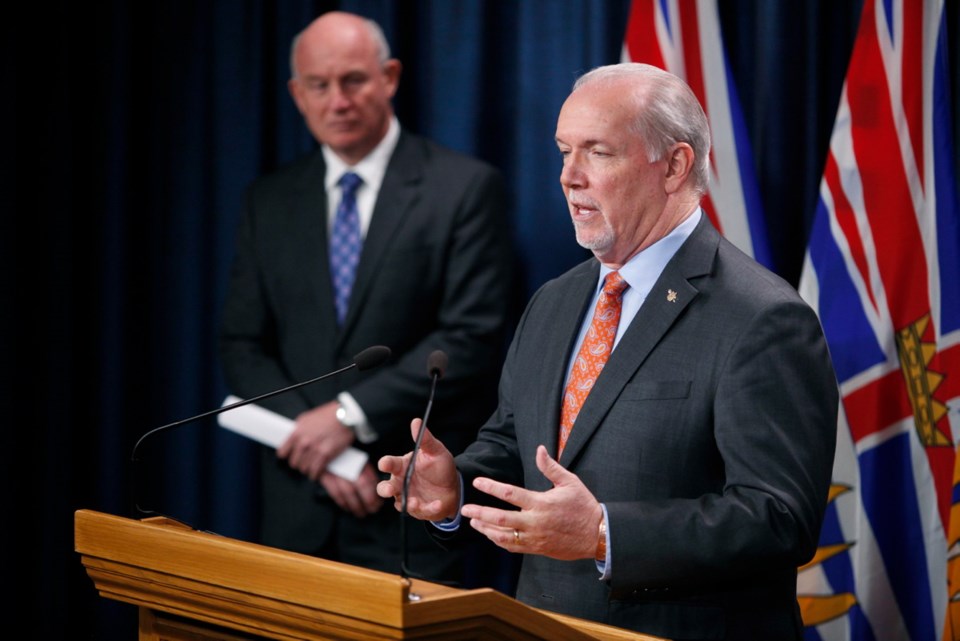What if we’d done this sooner? B.C. kicked up the level of emergency several notches Thursday by announcing plans for more major interventions in the economy and more restrictions to protect public health.
A characteristic of the pandemic response in B.C., Canada and elsewhere was a steady escalation of countermeasures as the case count rose. (From 13 in B.C. on March 4 to 725 as of Thursday)
International travel advisories about specific countries became general warnings, then turned mandatory.
Then travel became virtually outlawed.
Recommendations on public gatherings followed the same trajectory, from voluntary, to a 250 person limit, to a 50 person limit.
The public health emergency became a full-scale provincial emergency a day later.
Thursday’s announcement from Premier John Horgan and Public Safety Minister Mike Farnworth raises the stakes higher.
Government is preparing now to make major interventions in the supply chain along with more stringent enforcement of social distancing.
It’s a bigger step than previous ones and raises the question of whether the strategy of gradual escalation was the best course.
Could a more immediate and severe response have worked better to flatten the curve of new COVID-19 cases?
What if the provincial emergency was declared earlier, and enforced immediately?
It would have brought home the enormity of the crisis a few weeks sooner.
But it would have shocked and frightened people far more. It would have dislocated even more of the economy for a longer period of time.
And it was important for the entire country to have roughly comparable responses, without provinces getting too out of step.
That need for coordination also applies within B.C, so most municipal emergency declarations were swept aside Thursday and superseded by the provincial one.
Horgan said government is responding methodically to science-based information.
Too soon to pass judgment now. Health analysts and economists will spend the rest of their careers trying to answer that question.
B.C.’s leadership is still paying full tribute to “most” British Columbians’ efforts to comply with the directives issued in the past month.
But Thursday’s announcement made clear it isn’t good enough.
Health Minister Adrian Dix stressed numerous times this week that “100 per cent compliance” is needed. He didn’t estimate the percentage rate currently. But it’s obviously not where the government wants it.
Farnworth said: “While many are playing their part, we have all seen examples of some who continue to defy orders and instructions. … It has become clear that additional extraordinary measures are necessary.”
So provincial emergency powers will soon be much more in your face.
Secondary resale of food and essential goods (aka profiteering) will be banned.
Restricting quantities of items purchased at point of sale (rationing) will be imposed by law, not by retailers.
Municipal bylaw officers will enforce provincial health officer orders.
All the closed public facilities, like rec centres, will be made available for use as warehouses, or hospitals.
A “supply chain co-ordination” unit now has the power to control distribution of essential goods.
Despite the prospect of more stringent measures, a big part of the economy is still open for business.
Thursday’s announcement stated that any business not specifically ordered to shut down can stay open if it follows the health rules.
And the list of essential services that won’t be considered for closure runs seven pages. Apart from all the obvious ones, it includes: pet-food stores, veterinarians, liquor and cannabis stores, pawnbrokers, garden supplies, mechanics, laundromats, lawyers and media, among many others.
So social distancing applies more to individuals at this point, than sectors of the economy. You can still move about many parts of your life, as long as you take all the rigorous precautions.
Still, as business leaders have acknowledged, the front-line service economy is going to be ravaged by the pandemic response, regardless of how the pandemic progresses.
B.C. is planning as best it can, but one factor out of its control is the United States.
The national response there is an unimaginable shambles, led by an incoherent president who is resisting all logic.
What happens there will have a big impact on the supply chains B.C. and Canada are trying to protect.



